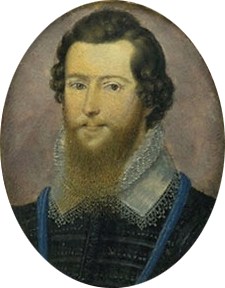Robert Devereux, Earl of Essex
Robert Devereux, Earl of Essex, fought in the English Civil War and was one of the most prominent Parliamentarian military commanders. His father, the second Earl of Essex, was executed for treason.
Born in 1591 to Robert Devereux, Essex had a privileged childhood. He was an earnest child who was married at the age of 14 to Frances Howard. He was sent on a European tour immediately afterwards to prevent the young couple from consummating the marriage. The marriage was annulled as a result of his alleged impotence. The annulment meant that Frances could marry James I’s favourite, Robert Carr, the Earl of Somerset, whom it is rumoured she fell in love with while still married to Robert. Around this time, Essex began to develop a strong dislike of the Stuarts.
In 1620, Essex joined the Thirty Years War and fought in the Palatinate. In 1639 he became second-in-command in the Bishops’ War as a result of his Puritanism. However he was denied a command in the second, pushing him further into the arms of the growing number of the King's opponents in Parliament.
Essex firmly supported Lord Stafford’s attainder (a punishment that deprived nobles of their lands and often their lives). By 1642 he made it very clear that he supported Parliament.

Ashortly after being appointed General of the Parliamentary army, Essex suffered a defeat in the very first battle at Powick Bridge. Although this was only a small conflict it boosted the Royalist’s morale.
Essex did manage to prove himself as a successful leader. For example, in September 1643, he won a major victory against Charles at Newbury. His primary task as a military commander was to protect London - an objective he achieved.
Essex encountered officers in the Parliamentarian hierarchy who refused to accept him as leader, including the Earl of Manchester, Edward Montagu.
This was illustrated in the run up to the Second Battle of Newbury in 1644 when Essex was overruled by a council of generals. Faced with such divisions, Oliver Cromwell encouraged Parliament to create Sir Thomas Fairfax’s New Model Army.
On 2 April, shortly after the Self-Denying Ordinance was signed, Essex and Manchester gave way and resigned their commissions. The next day a revised Self-Denying Ordinance was approved by the House of Lords. This discharged members of both Houses from military commands but did not reject the possibility of their future reappointment. Although Essex still had many supporters in Parliament, he had enough opponents to block his re-emergence as a military leader at this stage.
The Earl of Essex died in September 1646 without an heir. After hunting in Windsor forest he had a stroke and died in London, at Essex House, four days later on 14 September 1646.
See also: Lord George Goring
MLA Citation/Reference
"Robert Devereux, Earl of Essex". HistoryLearning.com. 2026. Web.
